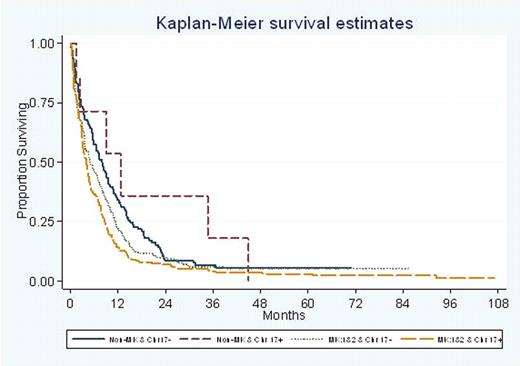Abstract
Abstract 1495
Monosomal karyotype (MK) is a stronger indicator of dismal clinical outcome than complex karyotype alone among patients with acute myeloid leukemia (AML) (J Clin Oncol 26: 4791–4797). We previously reported that Chromosome 17 abnormalities are associated with worse overall and relapse free survival among patients with AML and complex karyotype (ASH 2009, Borthakur et al #1501).
To investigate the impact of chromosome 17 abnormalities on the overall survival (OS) and eventfree survival (EFS) in AML patients (pts) with complex cytogenetics after monosomal karyotype is taken into account.
We conducted a review of 1086 pts with newly diagnosed AML treated at MD Anderson Cancer Center between January 1998 and December 2007. Four hundred eighty-three pts had complex cytogenetics defined by the presence ≥ 3 unrelated cytogenetic abnormalities and 37 patients were excluded from the final analysis because of poor performance status (≥ 3 ECOG) at presentation, a population least likely to be offered therapy. Monosomal karyotype (MK+) was defined as presence of at least an autosomal monosomy and a structural chromosomal abnormality or at least two autosomal monosomies. Cox proportional hazards regression was used to model the association between potential prognostic factors and survival (OS and EFS). The Kaplan-Meier product limit method was used to estimate the median time to death or event. Statistical analysis was performed using STATA/SE version 11.2 statistical software (Stata Corp. LP, College Station, TX).
Of the 446 pts with complex cytogenetics, 342 (76.7%) pts had MK and 183 (41.0%) pts had chromosome 17 abnormalities (Ch17+). The median age for the entire cohort was 64 years (range: 13–86). One hundred eighty-one (40.6%) pts achieved complete remission (CR/CRp) after induction chemotherapy, 173 (38.8%) pts had resistant disease and 89 (19.9%) had early death.
Median OS among pts with MK+ was 4.7 months compared with 8.4 months in MK- patients (Hazard ratio [HR]: 1.37, 95%CI: 1.09–1.72, p=0.006) and was 4.4 months among pts with Ch17+ compared with 6.7 months for Ch17- (HR: 1.28, 95%CI: 1.05–1.55, p=0.014) (Fig.1). Within the group of patients with MK+, additional presence of Ch17 abnormalities was associated with worse OS (HR: 1.23, 95%CI: 1.00, 1.53, p=0.046).On multivariate analysis age, high WBC and MK+ (HR: 1.47, 95%CI: 1.17–1.85, p=0.001) were the variables associated with shorter OS to the exclusion of Ch17+. On the other hand age, higher WBC and Ch17+ (HR: 1.25, 95%CI: 1.04–1.50, p=0.019) were the variables that correlated to shorter EFS to the exclusion of MK+.
Among patients with AML and complex cytogenetics, monosomal karyotype is associated with poor outcomes. Additional presence of chromosome 17 abnormalities further worsen outcome in this particularly poor-risk patients with AML.
No relevant conflicts of interest to declare.
Work was partly supported by Cancer Center Support Grant (NCI Grant P30 CA016672).
Aziz Nazha and Vijaya Raj Bhat contributed equally.
Author notes
Asterisk with author names denotes non-ASH members.


This feature is available to Subscribers Only
Sign In or Create an Account Close Modal